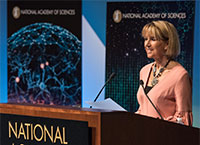News from the National Academy of Sciences
May 1, 2017
NAS President Marcia McNutt Delivers Her First Annual Address to Members
 |
Washington, DC - Today during the National Academy of Sciences' 154th annual meeting, NAS President Marcia McNutt, in her first speech to the members of the Academy, stressed the ongoing vitality of America’s scientific enterprise, and called on the country to strengthen its support for science and to continue to turn to science for solutions to the nation’s and the world’s most pressing challenges.
The age of scientific discovery is “alive and well,” McNutt said. “Even greater discoveries will emerge in the years ahead if America sustains and strengthens – not weakens – its support for science,” she added.
McNutt said that she has been reaching out to the new administration to discuss how the Academy could provide advice on issues of importance, such as national security, American competitiveness, and improving health care. She announced that she was reviewing how the Academy -- together with the National Academy of Engineering and the National Academy of Medicine -- could become more nimble in responding at an accelerated pace to the advisory needs of federal policymakers.
In addition, the Academy should increasingly bring its expertise to bear on growing socio-economic concerns such as U.S. workers being displaced by robotics, disruptive technologies, and international competition, McNutt said. She cited an upcoming National Academies report on how to build America’s skilled technical workforce as an example of how the Academy can be relevant in this policy sphere.
McNutt emphasized that science has the tools to address issues of global concern as well, including inequality, aging populations, climate change, pandemic diseases, and the root causes of terrorism. She said that it was important for the Academy to be visible on the global stage “to assert that U.S. science is still vibrant and willing to assume leadership” at a time when the U.S. government may be signaling a retreat from international alliances.
The Academy also “must be at the forefront of issues to ensure the rigor and integrity of the scientific enterprise, above all else,” McNutt declared. She noted that the Academy recently held a three-day colloquium on reproducibility of research and issued a new report on fostering scientific integrity. “Because the scientific method is the most reliable generator of knowledge of the world we live in, we, as an Academy, have a responsibility to do everything possible to nurture the self-correcting nature of science, and to safeguard the public’s trust in it,” she said.
McNutt informed the members that the Academy is strengthening efforts to engage the public in science “in light of concerns that the respect for evidence in decision-making is waning and the acceptance of alternative facts is waxing.” One initiative will expand upon the success of the Academy’s Koshland Science Museum to build virtual platforms and stage events that will reach much larger audiences. Another project, tentatively titled ‘America Asks, Science Answers’ will provide accessible, evidence-based information on urgent, science-related questions about issues such as the safety of genetically modified organisms or the impacts of fracking. “The ultimate goal is to ensure that the Academy be a portal for those seeking knowledge,” McNutt stated.
The National Academy of Sciences is a private, nonprofit institution that was established under a congressional charter signed by President Abraham Lincoln in 1863. It recognizes achievement in science by election to membership, and — with the National Academy of Engineering and the National Academy of Medicine — provides science, engineering, and health policy advice to the federal government and other organizations.
Contact:
Molly Galvin, Senior Media Relations Officer
Office of News and Public Information
202-334-2138; e-mail news@nas.edu
Twitter: @theNASciences

